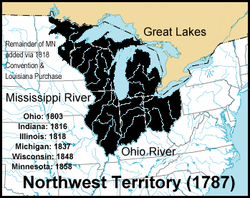Some years ago in another thread I asked what would happen if the 'Northwest Territory" remained under British control, focusing mostly on the intimidate post American Revolution period.
What I am wondering is how a smaller US and larger British North America would shape two particular events: The War of 1812 and the American Civil War/Slavery debate.
With the War of 1812 a larger British North America would of course be a harder target to attempt to occupy, but how would the American political situation change as a result? Would the chances of a independent New England emerging from the Hartford Convention talks be increased? If so would New York and Pennsylvanian be more inclined to join with New England?
The second point is the American Civil War, which with a smaller US I don't see happening to the same extent. IF it happens. How the slavery debate plays out depends very much on what happens in the War of 1812 as without New England the abolitionist movement would be much weaker. Not to mention America expansion would have a more southerly direction then historically, into Mexico more with British having influence over much more of the continent.


What I am wondering is how a smaller US and larger British North America would shape two particular events: The War of 1812 and the American Civil War/Slavery debate.
With the War of 1812 a larger British North America would of course be a harder target to attempt to occupy, but how would the American political situation change as a result? Would the chances of a independent New England emerging from the Hartford Convention talks be increased? If so would New York and Pennsylvanian be more inclined to join with New England?
The second point is the American Civil War, which with a smaller US I don't see happening to the same extent. IF it happens. How the slavery debate plays out depends very much on what happens in the War of 1812 as without New England the abolitionist movement would be much weaker. Not to mention America expansion would have a more southerly direction then historically, into Mexico more with British having influence over much more of the continent.


Last edited:
